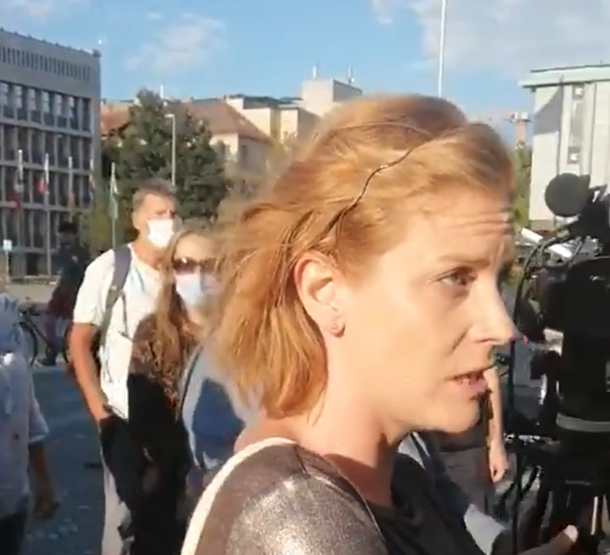By: Sara Bertoncelj / Nova24tv
“In no normal democracy would there be a government with which the absolute majority of the population would be dissatisfied,” Tea Jarc told reporter Andreas Schmid, adding that about 70 percent of Slovenes support the protests. In addition, she smoothly made up that Prime Minister Janez Janša wanted to privatise water. It seems to her that the Prime Minister could even jeopardise European values during Slovenia’s presidency of the EU Council, and according to her he is considered politically unpredictable: “At some point he completely changed his mind and became a right wing populist dictator,” she told a German journalist.
We have already written today about the way in which Friday’s protesters also get attention in the foreign media. It turned out that Tea Jarc had a coffee with journalist Andreas Schmid and told him lies, which he wrote completely uncritically. These days, two of his articles about Slovenia were published in Munich’s Merkur – Jarc appeared in both. Franci Kindlhofer pointed out that the journalist, among other things, accepted Jarc’s statement that Prime Minister Janez Janša was a convicted criminal without hesitation, and he also fell for her statement that she is not interested in political parties. In the first article entitled “Caring for Slovenia: How “Mini-Trump” Janša is creating Hungary 2.0,” Schmid discusses one of the most controversial heads of government in the European Union, and also cites the critical views of Marjan Šarec, Alenka Bratušek, and Tanja Fajon. That this is balanced journalism would be really hard to argue.
In the second article entitled “Protest Movement in Slovenia: What is left to us if we no longer have democracy,” Schmid wrote that demonstrations against Prime Minister Janez Janša are increasing. “Government critic” Tea Jarc spoke about the protests in an interview. He wrote that the right wing conservative politician was accused, among other things, of violating freedom of the press, suppressing unpleasant opinions with an increasingly authoritarian leadership style, and that Janša was increasingly oriented towards Hungary and Viktor Orban in his policy. In addition, the number of allegations of corruption is increasing in the country – all of which, of course, was dictated to him by Jarc.
Jarc added that they played golf and badminton at one of the protests in front of the parliament, and that they were then punished for interpreting it as a political statement. This, of course, is not true, no one has been punished for making political statements, but for violating ordinances during an epidemic. She boasted that at one point there were 15,000 protesters and that they stopped traffic in the middle of Ljubljana. The latter is true, however, as far as counting is concerned it is known how this goes with the left. She said that Janša often flies to the top of Triglav by helicopter. On the day of the incident in Kredarica, they heard rumours that the Prime Minister was also going to Triglav, which they could hardly believe, but then he really showed up.
Jarc said that in no normal democracy would there be a government with which the absolute majority of the population is dissatisfied. Apparently she has not heard of the election yet? According to Jarc, their protest movement is very important, and the referendum on nature conservation was also very successful. “Janša wanted to privatise water,” she smoothly made up. She explained that many people voted against the law not only to preserve nature, but also to show the government that they do not stand behind it. In her opinion, the referendum was a clear sign of distrust towards Janša. In short, she told the German media journalist all sorts of fabrications, with the help of some representatives of the opposition – from whom we will certainly hear accusations that the foreign media write badly about the situation in Slovenia.
